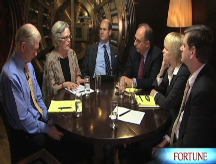How to make money with rates at zero
Treasury bonds don't offer much in the way of income anymore. Here are some better ways for investors to profit in 2009.

 |
| With hopes diminishing for a quick economic recovery and the Fed slashing interest rates, the yield on the benchmark 10-Year U.S. Treasury has plummeted. |
NEW YORK (CNNMoney.com) -- Federal Reserve Chairman Ben Bernanke may eventually be hailed as an economic Santa Claus if the Fed's dramatic rate cut helps bring an end to this recession.
But if you're an investor relying on a fixed income, Bernanke is The Grinch Who Stole Your Yield. Now that interest rates are effectively at zero, you won't get much from owning Treasurys. The U.S. 10-year note sports a puny yield of 2.19%, for example.
With many experts predicting rocky times through 2009, it's more important than ever for investors to own stocks and bonds that offer decent yields and a margin of safety.
One way to do that is with stocks that pay dividends. Many blue-chip stocks have yields well north of 5%, companies such as AT&T (T, Fortune 500), Verizon (VZ, Fortune 500) and Pfizer (PFE, Fortune 500).
Sure, some of these so-called "widow and orphan" stocks may not seem terribly exciting. But you know what? Earning 5% with a boring blue chip is better than losing all your money with Bernie Madoff.
"Many investors are concerned the market may be flat for many years. We feel that's unlikely, but even if that were the case, earning a 5% yield might not be that bad," said Steve Neimeth, manager of the SunAmerica Value fund. "Even if the market is flat for two to three years, investors could get paid to wait for a recovery."
Neimeth, who owns Verizon, Pfizer and AT&T in his fund, also likes food giant Kraft (KFT, Fortune 500), which yields about 4.3%.
Of course, it's always worth asking if a dividend-paying company is financially healthy enough to keep paying out.
Bank stocks' high yields looked attractive earlier this year, but many institutions have since slashed their dividends - some near a penny per share - because of the credit crunch.
And one fund manager said that any bank asking the Treasury Department for capital is irresponsible if it continues paying dividends.
"Banks should not be paying any dividends if they are going to the government for money," said Don Wordell, manager of the RidgeWorth Mid-Cap Value fund.
Instead, Wordell said he's focusing on technology companies that he believes are healthy enough to keep paying their dividends. Two of his top holdings are Intersil (ISIL), a semiconductor company with a 5% yield and no debt, and Harris Corp (HRS)., which makes radio communications equipment and has a yield of 2.2%
Paul Alan Davis, co-manager of the Schwab Dividend Equity fund, sees good opportunities in the beaten-down energy sector, including natural gas company Williams Companies (WMB, Fortune 500) and oil firms Chevron (CVX, Fortune 500), Exxon Mobil (XOM, Fortune 500) and Occidental Petroleum (OXY, Fortune 500). These stocks all pay yields ranging from about 2% to 3.3%.
These yields may not sound that lucrative, but Davis said it's more important to focus on companies with the potential to grow their dividends, not just those with super-high yields. After all, the yield is the dividend divided by the stock price, so an extremely high yield could actually be a warning sign.
Dividend-paying stocks aren't the only way for investors to profit from a steady income stream. Sabur Moini, manager of the Payden High Income fund, has found plenty of opportunities in the world of high-yield corporate bonds.
Yes, many high-yield bonds are inherently risky. But Moini said there are values now because the market is pricing in higher default rates than he thinks are likely next year.
"Clearly we are in a recession and 2009 won't be good," he said. "But a number of companies that raised money in 2005 and 2006 are fine and won't have to refinance or have debt coming in due in the next year."
The key, Moini said, is to focus on companies in defensive industries that generate strong cash flow.
"The bonds we own have attractive yields and the companies will be around for the next few years. We are staying away from autos, homebuilders and more cyclical companies," he said.
Some of Moini's top investments are high-yield bonds of cable company Cablevision (CVC, Fortune 500), satellite TV firm DirecTV (DTV, Fortune 500), hospital operator HCA, which was taken private in 2006, and privately held California supermarket chain Stater Brothers. The bonds for all four companies yield more than 10%
Jeffrey Saut, chief investment strategist for Raymond James Financial, said he's looking more closely at high-yield investments and finding the best values in funds that invest in municipal bonds.
Even though the credit crisis has many state and local governments dealing with major budget problems, Saut said the pessimism in the muni bond world is overdone.
"Unless all municipalities go bankrupt, there are some funds trading at big discounts with the potential for stock-like returns," he said.
Three funds he recommends are the Nuveen Insured Dividend Advantage Municipal (NVG) fund, which yields about 7.5%, the BlackRock MuniHoldings Insured Fund II (MUE), which yields almost 8%, and the Lord Abbett Bond Debenture fund, which yields nearly 9%.
Rob Arnott, chairman of Research Affiliates, a Newport Beach, Calif.-based money management firm with about $30 billion in assets under management, agreed that investors should look to bonds for bargains.
He said that while the stock market is probably accurately factoring in the likelihood of a long recession, bond investors are much gloomier and are pricing in another Great Depression.
"The out-of-mainstream parts of the bond market are wildly attractive. Why would anyone hold cash yielding zero when they can get double-digit yields?" asked Arnott, whose firm is the subadviser for the PIMCO All Asset fund. ![]()



